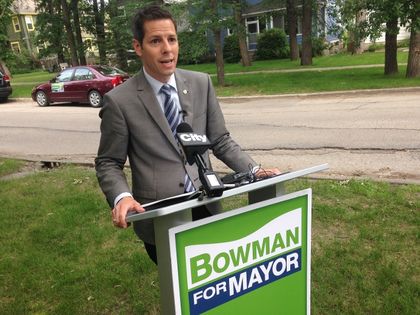MB: Bowman's Comments Disappointing
It was very disappointing to see Mayoral candidate Brian Bowman quoted in a Winnipeg Sun article today blaming the embarrassing conditions of Winnipeg’s roads on the city’s previous property tax freeze.
“…we've seen the results when we drive on our roads and what a tax freeze means to having or not having the resources we need."
I often hear that claim by those who usually push for high tax rates and a large role for government in our lives; the same type of people who are always quick to push for raising taxes rather than do heavy lifting and go after inefficiencies.
I wish Brian wouldn’t have gone there but I guess it is part of his campaign strategy? Or worse - something he actually believes?
Either way, here’s why it’s a stretch to blame our embarrassing road conditions on the “property tax freeze” at city hall:
1) Context – the freeze began because our taxes were much higher than other cities. City council had to do something. But even then, while property tax rates were frozen, the city still received additional property tax revenue from new developments and other sources; eg. raising your water and sewer rates, then taking a “dividend.”
2) Priorities – Winnipeg has gone through an unprecedented period of spending tax dollars on “nice to have” items rather than “need to have” projects like road repair.
Over the past decade, hundreds of millions of dollars have been spent on a new arena, a new stadium, Assiniboine Park upgrades, a new Upper Fort Gary park on Main Street, the Human Rights Museum, a new park out by the floodway, etc.
Whether you like the decision to spend tax dollars on those projects or not, it is obvious that our basic infrastructure has suffered as a result.
Could we have pushed back the time frame for at least a couple of those projects a bit and instead put a dent in our decrepit streets? Of course. But our elected officials chose to fund the shiny, sexy projects instead of projects that don’t have ribbon cutting ceremonies; fixing your street or a couple lanes on Portage or Pembina Highway.
3) Cost Overruns – How many projects have gone way over budget now at city hall? The water treatment plant, the new police headquarters, the fire halls, the stadium, etc. Those funds could have been used to fix our roads.
4) Salary and Benefit Costs –take a look at this blog post. Had the city kept salary and benefit costs inline with inflation and population growth over the past decade (instead of the explosion that we’ve seen) the city would have an extra $121 million for road repair each year; double what is spent right now.
5) Inefficiencies –For years we urged the city to sell 40 acres of riverfront land in West St. Paul and prime land on Kenaston Blvd as a snow dump. These two parcels of land have either been recently sold or are in the process of being sold, but how many other pieces of land out there could be sold off and developed to get some cash coming into the city?
Alternatively, look at city-run fitness centres. Lifeguards at those facilities make about double what YMCA staff make, and not surprisingly, the facilities lose $10 million+ annually. Meanwhile, YMCA facilities all break even. Imagine an extra $10 million or so a year going towards roads each year.
Pay attention to city issues and you’ll find all kinds of other examples of room for improvement. Make no mistake, some good decisions have been made over the years to save the taxpayer money, but there’s still a lot more to do.
Summary – First, I should note that I’ve known Brian for years and I think he’s a nice guy on a personal level. But we’re talking policy here and I’m paid to push elected officials for reasonable tax rates and responsible spending. The taxpayer is pretty beat up in this province as it is…thus I’m not going to sit back and listen to the perpetuation of myths such as the idea that city hall is a helpless organization that simply needs more money.
What we need is much more focus on going after wasteful government spending rather than ways to take more money from peoples’ pockets.

Photo credit: Winnipeg Sun